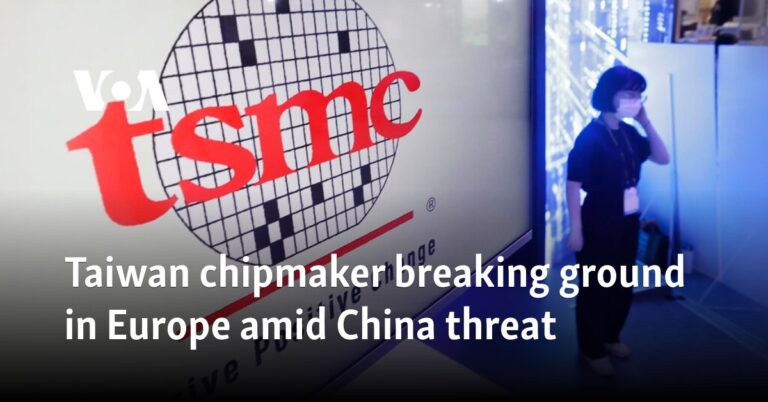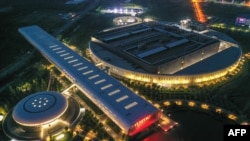Next week, Taiwan Semiconductor Manufacturing Co. (TSMC), one of the world’s top makers of advanced computer chips, is expected to open its first European factory in Dresden, Germany, in a move to move production out of Taiwan and decentralize the threat from China.
TSMC is the largest supplier of semiconductor chips used in everything from computers to cars to medical devices. It will own a 70 percent stake and operate the nearly $11 billion factory. The joint venture, which also includes minority shareholders Robert Bosch, Infineon Technologies and NXP Semiconductors, will be called European Semiconductor Manufacturing Company (ESMC).
The Dresden mayor’s office confirmed to VOA that the groundbreaking ceremony will take place on August 20th, making ESMC the largest investment project ever in the German state of Saxony.
Analysts say Beijing’s threats to Taiwan prompted TSMC to move its operations out of the autonomous region, which it believes must secede and one day reintegrate into China, by force if necessary.
TSMC is already building a new factory in Arizona, US, with a total investment of $65 billion, and is also building a factory in Japan for nearly $9 billion.
Anna Rita Ferrara, political and international law adviser at the Italian research institute, told VOA: “TSMC’s investments in Germany and the US are a strategic move to ensure the microchip industry has an advantage in case of a Chinese invasion of Taiwan. Relocating production to two major Western cities (Dresden and Phoenix) would help protect Western IT sectors from dangerous supply cuts and possible technological catastrophes.”
TSMC has a $3 billion factory in Nanjing on the mainland, where it has been making less advanced chips since 2016.
According to European statistics platform Statista, TSMC has a 61.7% share of the global semiconductor market, followed by second-placed Samsung with 11%.
The Dresden plant is scheduled to start up and produce 40,000 chips per month, including 12-nanometer automotive chips that are more advanced than those made in Taiwan.
The Taiwanese semiconductor giant did not immediately respond to VOA’s request for comment on the Dresden fab opening and the importance of diversifying away from Taiwan in the face of the Chinese threat.
TSMC Chairman CC Wei told reporters in June that the company had considered moving factories outside Taiwan but that it wasn’t possible because up to 90 percent of production is in the country, according to Reuters. “Instability in the Taiwan Strait is certainly a concern for the supply chain,” he was quoted as saying. “But I would say that we never want to see war break out.”
As China continues to threaten to force unification with Taiwan, Europe and the United States are working to attract domestic chip production to reduce reliance on imports from Taiwan.
The United States passed a semiconductor bill to invest $39 billion in 2022 to help semiconductor companies build factories. Following suit, the European Union last year also drew up a plan to invest $47 billion to increase Europe’s share of global semiconductor production to 20% by 2030.
“TSMC is coming to the EU because of the EU chip law, which was created to attract technology to the EU that doesn’t exist there,” Stephan Uhlig, vice president and senior consultant at Silicon Sachsen, a German regional semiconductor industry group, told VOA.
Uhlig said a third of European semiconductors come from Saxony: “The region is known as Silicon Saxony and is recognised as such not only in Europe but around the world. Many places around the world are semiconductor hotspots and some are big in terms of production capacity, but no place is as big as this in terms of the concentration of different semiconductor manufacturers in one place.”
Enrico Kau, an associate research fellow at Taiwan’s Center for International Strategic Studies, told VOA that having a factory in Europe is certainly part of TSMC’s global plan to improve the resilience of its supply chain and logistics, and it also helps move the entire supply chain closer to where chips are needed.
“It is unclear what impact these new factories may have on Taiwan in the long term under certain circumstances,” he said. “For example, if the supply chain were to experience significant disruptions due to war, natural disasters, or even energy shortages (especially the new AI industry, which is developing as Taiwan’s second core industry and requires more electricity), TSMC could be forced to relocate its cutting-edge manufacturing bases out of Taiwan temporarily or for an extended period of time.”
TSMC’s electricity consumption currently accounts for about 8% of Taiwan’s total electricity.
According to a Bloomberg report, the company is expected to account for about 8% of Taiwan’s GDP in 2022 and its market capitalization will exceed $800 billion, making it the ninth largest in the world, surpassing companies such as Tesla, JPMorgan Chase and Walmart, and far ahead of semiconductor companies such as Intel and Samsung.
Analysts say TSMC’s diversification of production could also boost Taiwan’s soft power on the global stage, where Beijing is seeking to squeeze Taipei.
Marcin Mateusz Jerzewski, director of the Taiwan office at the European Center for Values and Security Policy, told VOA that TSMC has undoubtedly enhanced Taiwan’s international status.
“As the world’s leading semiconductor manufacturing specialist, TSMC embodies technological excellence and innovation, significantly enhancing Taiwan’s soft power on the international stage,” he said. “However, our growing reliance on TSMC has created a delicate dilemma for Taiwan’s international standing, as Taiwan’s international perception is increasingly dependent on the success of this single company. This overdependence calls for a strategic reassessment to ensure sustainable economic and diplomatic relations.”
Jerzewski noted that while TSMC is a big part of Taiwan’s economy, it relies mainly on small and medium-sized enterprises, and said the government should strengthen ties with democracies and support investment in those countries to reduce the risk of over-reliance on any single company.
Adrianna Zhang contributed to this report.


